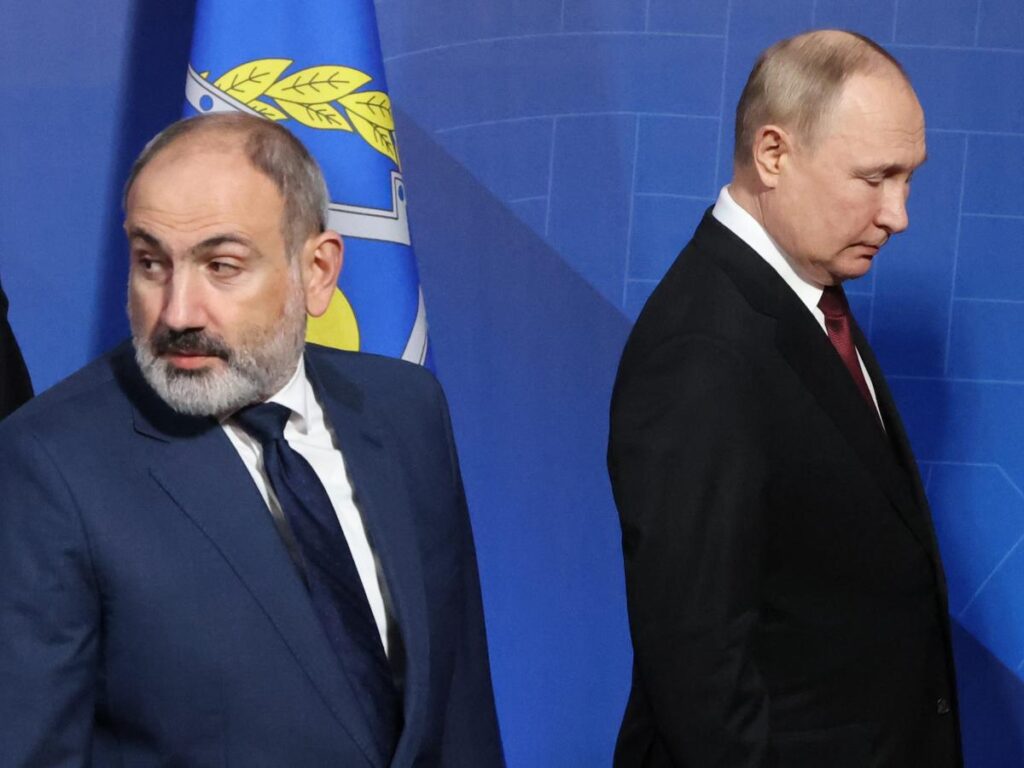-
Armenia said it sees no need to cooperate with Putin’s Collective Security Treaty Organization.
-
The prime minister said participation in the military alliance has been “frozen” “at all levels”.
-
According to a think tank, it has ignored the CSTO, seen as Putin’s answer to NATO, for almost a year.
A key Russian ally said it sees no need to cooperate with the Collective Security Treaty Organization, a group it widely supports. is considered President Vladimir Putin’s answer to NATOafter ignoring it for almost a year.
Nikol Pashinyan, the prime minister of Armenia, one of the six member states of the CSTO, made the statement at a press conference on Saturday, according to Unpleasant local media reports.
“Armenia has frozen its participation in the CVTO at all levels,” he said, according to a translation by the American think tank Institute for the Study of War.
Pashinyan said the Armenian public and other officials may have a different opinion about Armenia’s choice, but his government sees no reason to reconsider the decision.
However, he added that Armenia may “see the need to make a different decision” in the future, the ISW said.
Pashinyan announced his decision to leave the CVTO, a military alliance consisting of Russia, Armenia, Kazakhstan, Belarus, Kyrgyzstan and Tajikistan, in February.
But since mid-2023, Pashinyan and Armenian representatives have not participated in several OSCE events, including military exercises and political rallies.
With this, Armenia has effectively abstained from participating in the CVTO for almost a year, the ISW reported.
Experts told BI earlier this year that Armenia’s actions have damaged what Putin hoped to achieve through the alliancewhat the image of Russian power should convey.
There are tensions got up between Russia and Armenia since Putin’s large-scale invasion of Ukraine, which Pashinyan has repeatedly refused to support.
In June 2023, Pashinyan said his country was “not an ally of Russia in the war with Ukraine” and felt caught between Russia and the West.
The discontent in Armenia also stems from the conflict with neighboring Azerbaijan and the OVVO’s response to it.
The CSTO has a clause similar to NATO’s Article 5, which requires members to help each other if one is attacked. But when Armenia asked for help during its fighting with Azerbaijan in 2022, the CSTO did not send troops.
Pashinyan called the response “depressing” and “extremely damaging to the image of the CVTO, both in our country and abroad.”
Tensions between Armenia and Russia have since worsened and Armenia appears to have strengthened its ties with the West, including by buy western weapons and hold military exercises with the US.
Pashinyan then announced in the Armenian parliament in June that he to expel from the country of the CVTO as a whole.
At the time, Kremlin spokesman Dmitry Peskov said, said that Russia “will continue to work with our Armenian friends” to clarify their position.
Other CSTO members have also ignored Russia since it launched its full-scale invasion of Ukraine in February 2022.
Kazakhstan for example, refused Russia’s request to send troops when the invasion began, and has help sent to Ukraine.
The President of Tajikistan, meanwhile, seemed to reprimand Putin at a meeting of Central Asian leaders in October, demanding more respect for his country, despite its small size.
However, these countries have kept their resistance to a minimum.
Experts in the region previously told BI that Russia, as the group’s leader and by far its largest member, wields so much power over member states that it is unlikely other members will leave the alliance.
Thomas Graham, co-founder of the Russian, Eastern European and Eurasian Studies program at Yale University, told BI earlier this year that Armenia has never been as closely connected to its fellow member states as it is to each other and to Russia, making it the most likely country to pull out.
Read the original article at Company Insider







